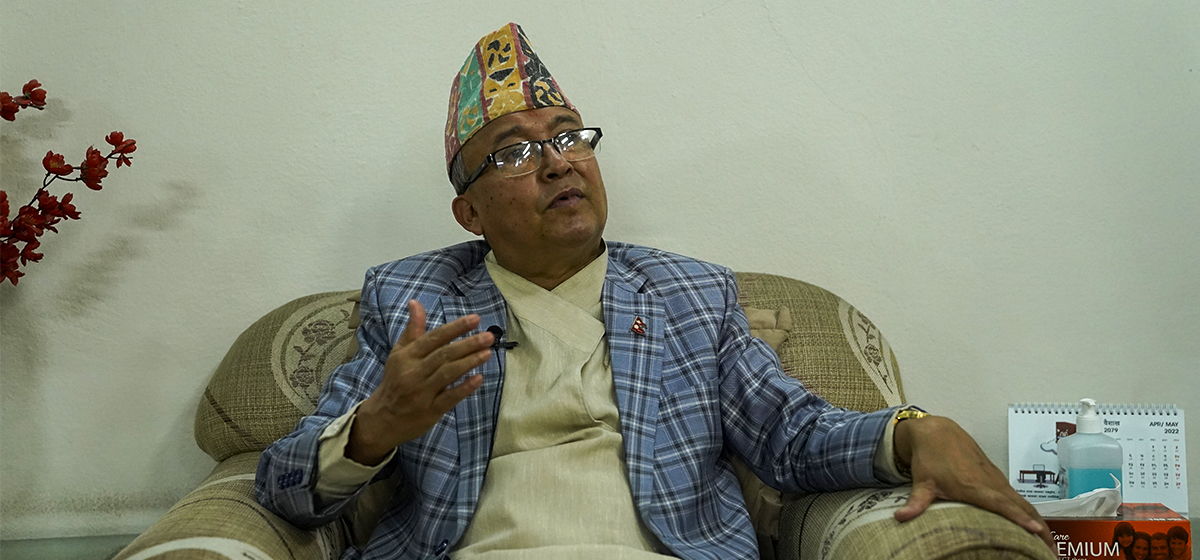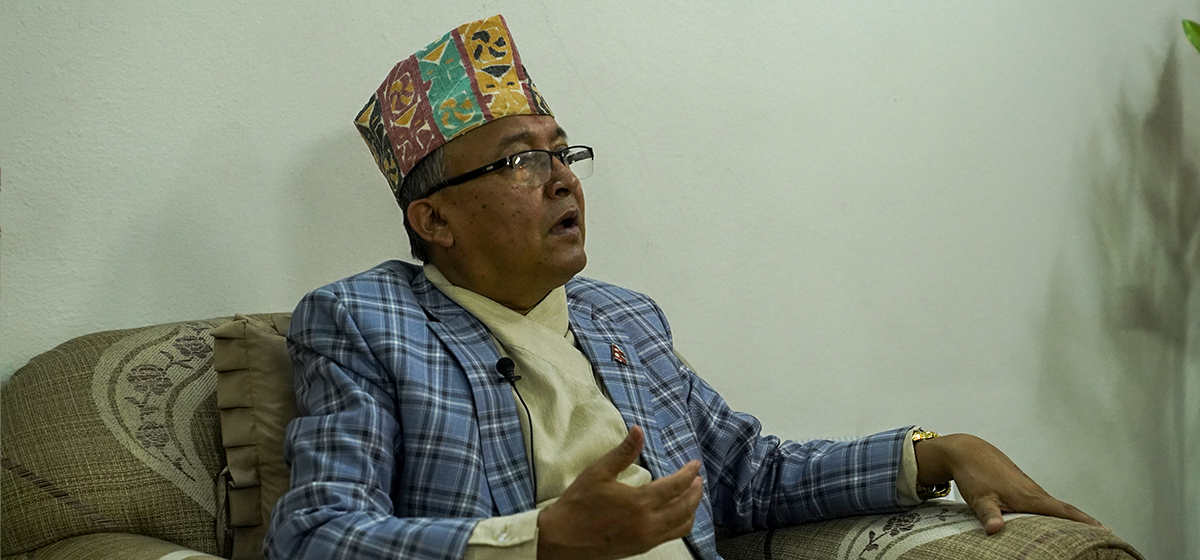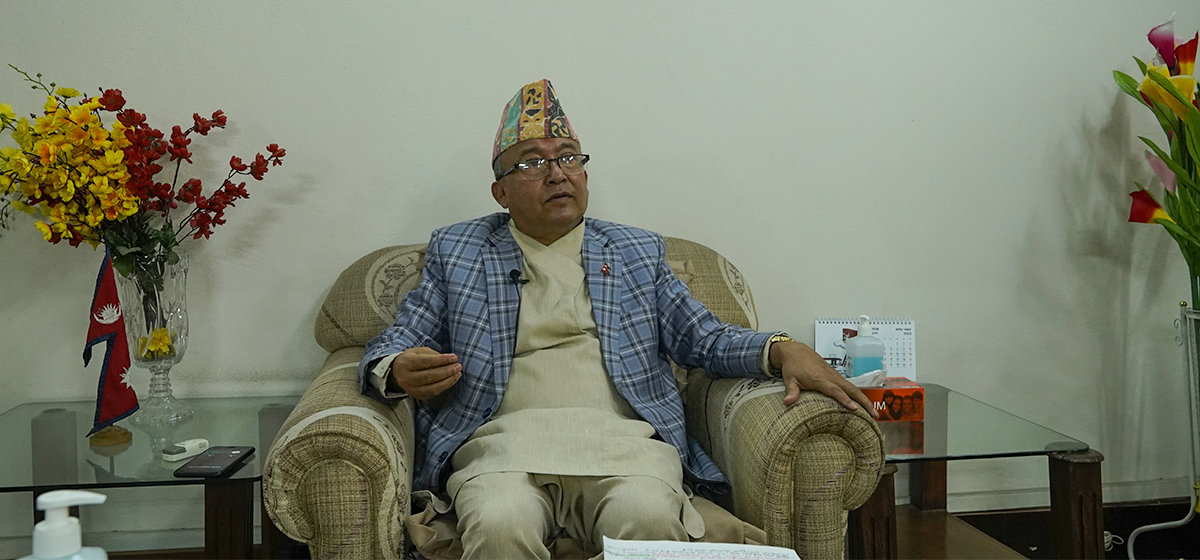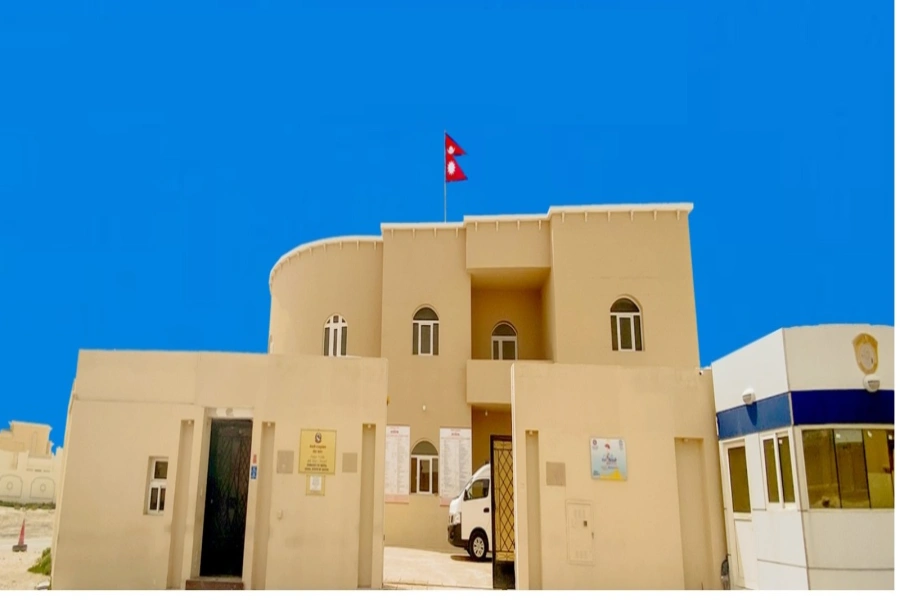Local level elections are being held on May 13 to elect new sets of people’s representatives in all 753 local governments. This election is uniquely different at least for two reasons: Unlike in the previous election, the Election Commission (EC) is holding elections all across the country in a single phase — something government officials call a daunting task in terms of managing logistics and security. As social media platforms have emerged as an important tool of election campaign, the EC equally faces a newer challenge to contain misinformation, disinformation and hate speech and ensure effective implementation of the election code of conduct this time. Against this backdrop, Kosh Raj Koirala of Republica talked to Chief Election Commissioner Dinesh Kumar Thapaliya to understand a number of issues including the preparations being made to hold the elections, challenges the EC faces and, of course, the criticisms the EC has drawn for its failings. Excerpts:
Elections are just a few days away. What about the preparations?
After the date of the local level election was announced on February 7, the Election Commission endorsed an election schedule and began its works to conduct the election within the stipulated date of May 13. As I speak to you now, ballot papers have already reached all local units and almost all government staff have assumed their election duties. We have mobilized around 122,000 government employees and 54,000 volunteers for the polls. They have already left for their respective polling stations after receiving necessary training and orientation.
When you ask me to assess the preparations, I think it would be appropriate to talk about the works that are yet to be accomplished. All returning officers are scheduled to reach their respective polling stations by the evening of May 10. The first thing they will do is announce the silent period, which begins from midnight, the same day. They will also announce prohibited areas as needed. On May 11 and 12, voters' education programs will be organized to educate voters about the ways to cast votes. This will be followed by the actual election on May 13. So, I can tell you that over 90 percent of the works related to local level polls have already been completed.
How many polling stations and returning officers have you arranged for the election?
In view of the complaints that voters are often forced to travel long distances to cast their votes, we formed a Task Force to review the existing polling stations. Based on the recommendations of the Task Force, we have added 743 new polling stations, compared to the number of polling stations in the previous election. So, there will be a total of 10,756 voting stations. There are two to five election centers at each polling station. There are a total 21,955 election centers for this election. Locals are hired as volunteers for three days to help properly manage the election. We have received information that around 200,000 security personnel including 96,000 temporary police personnel will be mobilized to provide security during the election.
How many people's representatives are being elected through this election?
The local level election this year is directly electing 35,221 local government representatives and around 6,200 members of local government's executive bodies and District Coordination Committees will be elected from among the elected representatives later. In total, we will elect around 41,500 people's representatives all across the country through this election. There are a total of 145,007 candidates vying for these positions as per the final list of candidates published by the Election Commission.
It seems preparations for the polls are moving smoothly. However, there are complaints that EC is a bit lenient in terms of enforcing the election code of conduct? How is EC trying to address this concern?
To be honest, we held discussions with almost all stakeholders concerned for almost a year to introduce a new election code of conduct and ensure that elections are held in a free and fair manner. The election code of conduct we have now was prepared as per the broader consensus reached among all major political parties. Of course, there has been an important role of civil society and the media sector in this regard. All the issues that have been incorporated in the election code of conduct came from the discussions we held with our stakeholders.
Unfortunately, there is a tendency of political parties to stand for formulating stricter code of conduct and simply ignore the provisions of the same code of conduct when it comes to implementation. This tendency has made it difficult to effectively implement the election code of conduct. The code of conduct is a morally binding document with some legal restrictions. Since the election code of conduct has to do more with the moral restriction, effective implementation of this code is possible only when political parties demonstrate willingness and a resolve to self-regulate them accordingly. I can tell you that all stakeholders expressed their full commitment to implement this code of conduct earlier. The problem has occurred as the political parties that committed to effectively implement the code of conduct have now started snubbing it.
Vote counting will conclude by May 19: CEC Thapaliya

Nevertheless, the implementation of the code of conduct is satisfactory except for a few isolated incidents. If you compare this with the previous election, the violation of code of conduct has been contained to a large extent. We have delegated authority to the local level office to take action against those violating the code of conduct. We have also been seeking clarifications from election candidates and holding them accountable to the code of conduct. EC's central office has actively taken up cases of the violation of election code of conduct. Although there have been some cases of violation of the election code of conduct, the implementation of the code of conduct is getting relatively better during this election. These incidents have been noticed largely in the urban areas. We are taking appropriate measures to curb the incidents of such violations.
"The implementation of the code of conduct is satisfactory except for a few isolated incidents."

There are concerns that voters' education has not been as effective. This has given rise to speculations that the number of invalid votes will increase significantly during this election. How is the EC working to address these concerns?
We have tried to bring some changes to the voters' education this year. Earlier, we used to mobilize volunteers for 15 days before the election. But then there were concerns that the volunteers did not work impartially and they would somehow try to influence voters for one party or the other. We received complaints that such volunteers would somehow try to suggest voters to vote for one particular party. So, we decided to increase the use of digital platforms like social media. Also, we decided to increase the use of electronic media. We have been playing those publicity materials in electronic media.
In addition to this, we have decided to run voter's education for one or two days before the poll day. We will run the program in each polling station requesting all voters in the locality to visit there on May 11 and May 12 to learn how to cast their votes properly. A separate Voters' Assistance and Information Cell will be established at each polling station and voters will be provided with necessary information about voting. Since this cell works in a group there is no chance of voters being influenced for one party or the other. This, we expect, will help to uphold independence and integrity of the Election Commission. We have made these new arrangements to help improve voter's education and reduce the number of invalid votes. However, we are yet to see how many people will participate in the voters' education sessions that our teams in each voting station will conduct on May 11 and 12. Despite this, I am personally worried that the number of invalid votes may actually increase because of the current format of our ballot papers.
What measures has the Election Commission taken to avoid untoward incidents during the election? Can all voters be assured of their security during the election?
I think we have taken all necessary measures for this. Firstly, we have developed an integrated security plan at the local, district, provincial and at central level to ensure effective security for the election. We are closely following the security situation and receiving updates from the security agencies on a regular basis. Secondly, we have made arrangements for a three-tier security even this time. There will be security patrols in the villages from a few days before the election date to help people feel secure. Thirdly, we have formed a Joint Election Operation Center comprising representatives of all security agencies and the Election Commission. This helps us to establish contact with police officials even at the polling station in a remote district. The intelligence we receive helps us foresee potential security challenges. We will immediately inform respective police units and make necessary reinforcement of the security force.
We have expanded this arrangement further for election day. We will link this arrangement to each voting center. We have ensured adequate precautions to ensure free and fair elections. Voters can be assured of their security. In case of some isolated incidents, we have made arrangements for reserve forces to address such challenges. The untoward incidents during election occur due to various reasons including inter-party and intra-party conflicts. So, we have also requested all political parties to exercise restraint during the election. We are confident that there will not be any untoward incident during the election.
In addition to the security challenge, what other challenges do you foresee during the election?
We see different kinds of challenges during this election. This is the first time we have introduced measures to regulate social media. We have the tendency to show the weaknesses of our rivals to appear strong. Even as election publicity is meant to highlight the strengths or positive aspects of candidates, there is a tendency to criticize or even assassinate the character of others through misinformation, disinformation and hate speech. Social media has been used as a tool to propagate these activities. So, we have focused on containing misinformation, disinformation and hate speech being made through social media. Second important challenge that I see is potential hacking of social media platforms of responsible officials and spread of misinformation. There is a fear deep down in me that such a way of disseminating misinformation could even derail the entire election process.
Although I do not consider this to be a big issue, there are reports that almost all political parties have announced to mobilize a sizable number of their cadres to what they call 'secure voting stations'. We do not know whether this is being done with a good intention or to influence the election in different ways. I urge the political parties concerned to give their cadres a lesson of peace before mobilizing them at the polling stations and help the Election Commission to organize elections in a free and fair manner. Above all, this is the first time after 1990 that we are planning to conduct elections all across the country in a single phase. We will of course take lessons from this election for the upcoming provincial and parliamentary elections. However, we consider the exercise to conduct elections in a single phase as another important challenge. Nonetheless, this factor alone is less likely to pose difficulty for us to conduct the election in a free and fair manner.
We will of course take lessons from this election for the upcoming provincial and parliamentary elections. However, we consider the exercise to conduct elections in a single phase as another important challenge.

What are the preparations that EC has done for post-election management? How have you made necessary security arrangements to ensure transport of ballot boxes and organize vote counting in a secured manner?
Vote counting will be held in all 753 local units and the results will also be announced from all the 753 local units. We have made returning officers accountable for dispatching ballot boxes, ballot papers and employees to each polling station and local administration accountable for transporting ballot boxes to the vote counting place after the election is over. This is the strategy we have adopted to ensure effective poll management. We have received information that in some places in hill districts it may take more than a day to bring ballot boxes to the vote counting stations. They have, however, told us that they will try to bring the ballot boxes to the vote counting stations on the morning of the next day of the election. As per our preliminary estimation, vote counting in all local units will begin from 10 AM on May 14 and we hope to publish results of all local units by May 19.
As per our preliminary estimation, vote counting in all local units will begin from 10 AM on May 14 and we hope to publish results of all local units by May 19.
What arrangements have been made to ensure security at the vote counting stations? There were some unpleasant incidents in the previous election in which representatives of some political parties even swallowed ballot papers to affect the outcomes of the election.
For this election, we have mobilized a number of monitoring teams to make minute studies of different places. We have been receiving vital information from these teams. Based on that specific information, we have decided to mobilize teams led by joint secretaries in more than 16 districts deemed sensitive in view of election management. The number of these districts may increase in the days ahead. These teams will have special rights and they will exercise all the rights of the EC in the field itself. I believe all these measures will help to address these concerns.
Separately, we have asked all local governments through the Ministry of Federal Affairs and General Administration to install CCTV cameras in all vote counting centers. We can watch live the vote counting of more than 150 local units from the EC's central office in Kathmandu. In case of others, we can get the CCTV footage later to ensure that any miscreant activities do not affect the outcomes of the election. These will definitely help us to avoid such kinds of unpleasant incidents.
EC is also mobilizing the Election Observation Teams. How many teams have applied to monitor the election this time?
Around 60 organizations applied to observe the election. After a thorough analysis of the applications and the capacity of those organizations, we made a decision about their requests. Although the number was high at the time of application, this has come down and fewer organizations than those showing interest for the tasks initially are deploying teams for the observation of the election. We estimate that around 6,000 observers will be observing the election on the field. International observers, too, are scheduled to observe the elections on the election day both within the Kathmandu Valley and outside. We are told that the heads of some diplomatic missions in Kathmandu will lead such teams. The total number of international observers will be around 70. The diplomats observing the election will be accompanied by their Nepali staff and they will also be joined by observers arriving in Nepal from abroad. They will be a part of one-day observation teams.
We estimate that around 6,000 observers will be observing the election on the field.
You mentioned that various reforms were made in this election. How is this local level election different from the previous local level election?
Honestly speaking, we have not been able to bring much reforms yet as there is a tendency among people in Nepal to get scared of the word reform itself. However, we have tried to bring some important reforms to make the election more credible. As an example, we have decided to hold the election in a single phase. This will bring several reforms in the election process itself. Secondly, we have focused on election governance in relation to the candidates. We have made it mandatory for the elected people's representatives to resign from their posts and clear all the dues they owe to the local government before filing their candidacies. We have also made it mandatory to show if the candidate has any relation whatsoever with the contract and other works carried out at the local government level.
Similarly, we have ensured voting rights to all citizens who reach 18 years a day before the election. This is a new arrangement we were able to make for this election. We are also conducting a study on political financing to see how much candidates belonging to various political parties spend money for election campaigns. Based on the experience in the past, we also gave two days for filing the nomination of candidates. Although this was initially criticized, it is proved that we need to give at least three days time for filing candidacy in the election. Above all, we made necessary arrangements to register names in the electoral roll no matter where they are currently residing. I think the efforts of the EC to regulate social media and introduce necessary legislation to contain misinformation, disinformation and hate speech is among the most important reforms introduced during this election.
I think the efforts of the EC to regulate social media and introduce necessary legislation to contain misinformation, disinformation and hate speech is among the most important reforms introduced during this election.

What are the EC's expectations from other stakeholders including donor agencies?
We are happy to note that we have been receiving necessary cooperation from all stakeholders concerned including the donor agencies. EC feels that our biggest stakeholders are the political parties. We have an impression that the political parties are somehow trying to ignore the EC by flouting the election code of conduct in which they were very much involved right from the preparatory stage. Except for this, we have so far received full cooperation from all political parties to hold the election in a free and fair manner. Another biggest stakeholder of the EC is mass media. The level of support that the EC is receiving from the mass media and civil society is unprecedented. Other stakeholders of the EC are people, who are also voters, and civil society bodies and non-government organizations. The EC has received support from all these stakeholders. I see this as a demonstration of their commitment to democracy and election.
We are satisfied with the cooperation extended by the donor agencies. We talked to a few donor agencies to solicit support for this local level election. Basically, they told us three things: First, they said that they do not have enough time to make substantial support for the local level election. Second, they have assured us that they are ready to extend help if the EC asks them for substantial support for the provincial and federal election. Third is that they are keen to support us in kind rather than in cash. However, we have shared our expectation to receive some budgetary support as well. In fact, we have held discussions with them along these lines. As for now, we have received some support from the IFES/USAID and ESP project of the UNDP for different election-related tasks. We expect continued support of the donor agencies in the upcoming provincial and federal election as well.



-1772436151.webp)































